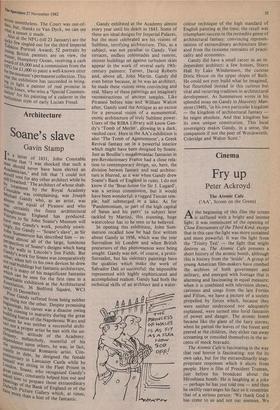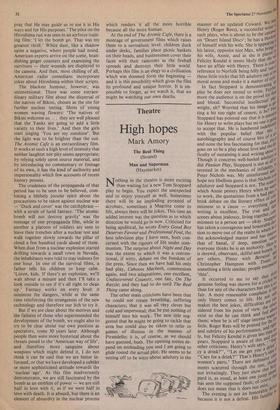Cinema
Fry up
Peter Ackroyd
The Atomic Cafe ('AA', Screen on the Green)
Athe beginning of this film the screen is suffused with a bright and intense light; it was reminiscent of the opening of Close Encounters of the Third Kind, except that in this case the light was more sustained and more powerful. It was the light from the 'Trinity Test' — the light that might destroy us. The Atomic Cafe presents a short history of the atomic bomb, although this is history from the 'inside'. A group of young American film-makers have combed the archives of both government and military, and emerged with footage that is alarming and fascinating in equal measure; when it is combined with television shows, cartoons and songs from the late Forties and Fifties, we have a picture of a society propelled by forces which, because they were neither understood nor adequately explained, were turned into lurid fantasies of power and danger. The atomic bomb became like the giant of the fairy stories; when he parted the leaves of the forest and peered at the children, they either ran away screaming or consoled themselves in the ac- cents of mock bravado.
The Atomic Cafe is fascinating in the way that real horror is fascinating: not for its own sake, but for the extraordinarily inap- propriate responses which it elicits from people. Here is film of President Truman, just before his broadcast about the Hiroshima bomb. He is laughing at a joke — perhaps he has just told one — and then he swiftly rearranges his face so it resembles that of a serious person: 'We thank God it has come to us and not our enemies. We
pray that He may guide us to use it in His ways and for His purposes.' The pilot on the Hiroshima run was seen in an airforce train- ing film: 'I let the bomb go. That was my greatest thrill.' White dust, like a shadow upon a negative, where people had stood.
American experts arrive on the scene, bran- dishing geiger counters and examining the survivors — their wounds are displayed to the camera. And then, most chilling of all, American radio comedians incorporate jokes about Hiroshima within their scripts.
The blackest humour, however, was unintentional. There was some extraor- dinary military film about the dispersal of the natives of Bikini, chosen as the site for further nuclear testing. Shots of young women waving flowers: 'The natives of Bikini welcome us ... they are well pleased that the Yanks are going to add a little
variety to their lives.' And then the girls start singing 'You are my sunshine'. But the light was to be brighter than the sun. The Atomic Cafe is an extraordinary film. It works at such a high level of intensity that neither laughter nor pity seems appropriate; by relying solely upon source material, and by introducing no commentary or footage of its own, it has the kind of authority and impersonality which few accounts of recent history possess.
The crudeness of the propaganda of that period has to be seen to be believed, com- bining a blithely jocular spirit about the precautions to be taken against nuclear war — 'Duck and cover' was the catchphrase with a strain of lurid fantasy. 'The atomic bomb will not destroy gravity' was the message of one propaganda film, while in another a platoon of soldiers are seen to leave their trenches after a nuclear test and walk together slowly towards the pillar of cloud a few hundred yards ahead of them. When dust from a nuclear explosion started drifting towards a small town in Nevada, the inhabitants were told to stay indoors for one hour. In one of the survival films, a father tells his children to keep calm. `Listen, kids. If there's an explosion, we'll wait about a minute and then I'll take a look outside to see if it's all right to clean up.' Fantasy works on every level: it minimise the dangers, 'while at the same time reinforcing the strangeness of the new technology and therefore our itch to try it.
But if we are clear about the motives and the failures of those who superintended the development of the bomb, we ought also to try to be clear about our own position as spectators, some 30 years later. Although people then were more hysterical about the threats posed to the 'American way of life', and therefore more sanguine about weapons which might defend it, I do not think it can be said that we are better in- formed, or that we have developed a subtler or more sophisticated attitude towards the `nuclear age'. As this film inadvertently demonstrates, we are still fascinated by the bomb as an emblem of power — we are still half in love with it, as if we were half in love with death. It is absurd, but there is an element of absurdity in the nuclear process which renders it all the more horrible because all the more human.
At the end of The Atomic Cafe, there is a montage of government films which raises them to a surrealistic level: children duck under desks, families place picnic baskets on their heads, and businessmen cover their faces with their raincoats as the fireball spreads and destroys their little world. Perhaps this film is an elegy to a civilisation which was doomed form the beginning and it is this possibility which gives the film its profound and unique horror. It is im- possible to forget, as we watch it, that we might be watching our own deaths.











































 Previous page
Previous page